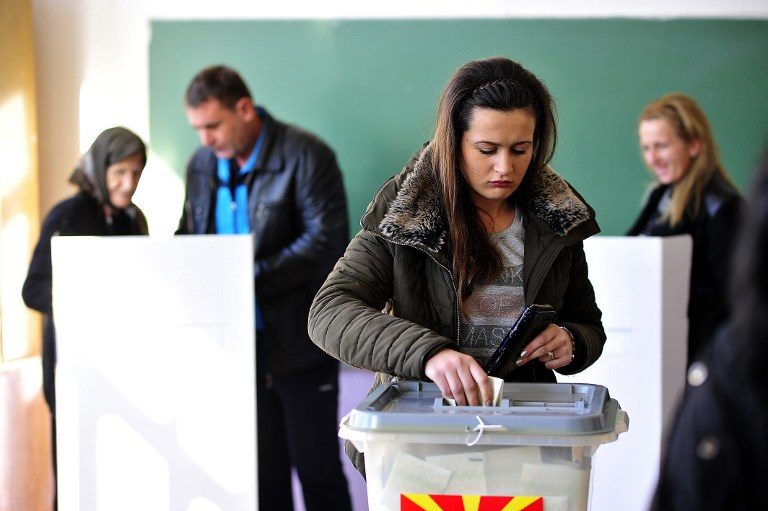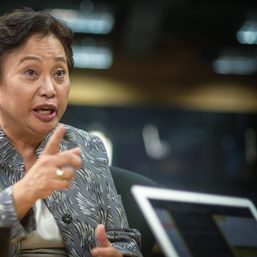SUMMARY
This is AI generated summarization, which may have errors. For context, always refer to the full article.

SKOPJE, Macedonia – Macedonia’s ruling conservatives edged a narrow victory against the opposition in a weekend election aimed at ending the Balkan country’s instability, results showed on Monday, December 12.
With votes counted at nearly 100% of polling stations the VMRO-DPMNE party of longtime ruler Nikola Gruevski had a narrow lead of 1.37% over the Social Democrats (SDSM).
Late on Monday the electoral commission announced that the VMRO-DPMNE would have 51 MPs, two more than the SDSM.
With the result so close, the political uncertainty that has plagued the nation looks set to continue, particularly as both the VMRO-DPMNE and SDSM had claimed victory on Sunday night, December 11.
The main ethnic Albanian political force, the Democratic Union for Integration (DUI), which has long been the junior coalition partner of the rulers, came third with 10 seats and could provide the VMRO-DPMNE a very fragile parliamentary majority.
Three more minor ethnic Albanian parties share remaining 10 seats.
“This neck-and-neck situation proves one thing for sure, that the political crisis is far from over,” Marko Troshanovski, head of the Institute for Democracy think-tank, said before the distribution of seats was known.
“After the election we can expect another political crisis … that will have to be solved in new parliamentary elections sooner or later,” he told Agence France-Presse.
Wiretapping scandal
Sunday’s vote was called as part of a European Union-brokered deal between Macedonia’s 4 main political parties after a mass wiretapping scandal erupted in February 2015 and sparked street protests.
The turnout was higher than at previous elections, nearly 67%.
Observers warned of some irregularities but no political party has complained about the electoral process or results so far.
Wiretapping allegations led Gruevski of the nationalist VMRO-DPMNE party to step down from the premiership in January after nearly 10 years in power.
The vote, which was twice delayed owing to international concerns over fraud, pitched the former prime minister against Social Democrat leader Zoran Zaev.
It was Zaev who released tapes last year that appeared to show the government had wiretapped thousands, including journalists and religious officials, as well as alleging high-level corruption.
Gruevski denied the claims and accused Zaev of planning a coup with foreign support.
Zaev, 42, has pitched the vote as a choice between “doom or life” and pledged to stop an exodus of young people from the former Yugoslav republic, which remains one of Europe’s poorest countries.
“Whoever wins the election will have huge challenges and issues to solve,” Zaneta Trajkoska, director at the Institute of Communication Studies, told Agence France-Presse.
Albanian kingmakers
Following the neck-and-neck results for the VMRO-DPMNE and SDSM, ethnic Albanian parties will likely play a key role as kingmakers, in a country where a quarter of the population is Albanian.
Albanian insurgents fought Macedonian forces in an uprising 15 years ago, leading to an agreement giving the minority group more rights.
Macedonia aspires to join both the EU and NATO but accession has been blocked by Athens owing to a dispute over the country’s name – Greece has a northern region also called Macedonia.
The latest EU progress report on Macedonia said democracy and rule of law had been “constantly challenged” in particular by “state capture”, referring to the considerable influence of private interests on state decisions.
Analysts however suggest Europe has brushed aside concerns because of Gruevski’s role as a “gatekeeper” in the refugee crisis – hundreds of thousands of migrants have entered landlocked Macedonia from Greece on their way to western Europe.
The refugee wave has put added pressure on the public purse in Macedonia, where the average net wage is around 360 euros ($380) a month and unemployment stands at nearly 24%. – Rappler.com
Add a comment
How does this make you feel?




![[PODCAST] Beyond the Stories: Ang milyon-milyong kontrata ng F2 Logistics mula sa Comelec](https://www.rappler.com/tachyon/2021/11/newsbreak-beyond-the-stories-square-with-topic-comelec.jpg?resize=257%2C257&crop_strategy=attention)





![[EDITORIAL] Ang low-intensity warfare ni Marcos kung saan attack dog na ang First Lady](https://www.rappler.com/tachyon/2024/04/animated-liza-marcos-sara-duterte-feud-carousel.jpg?resize=257%2C257&crop=294px%2C0px%2C720px%2C720px)
![[Free to disagree] How to be a cult leader or a demagogue president](https://www.rappler.com/tachyon/2024/04/TL-free-to-disagree.jpg?resize=257%2C257&crop_strategy=attention)
![[OPINION] Can Marcos survive a voters’ revolt in 2025?](https://www.rappler.com/tachyon/2024/04/tl-voters-revolt-04042024.jpg?resize=257%2C257&crop=251px%2C0px%2C720px%2C720px)
![[Edgewise] Quo vadis, Quiboloy?](https://www.rappler.com/tachyon/2024/03/quo-vadis-quiboloy-march-21-2024.jpg?resize=257%2C257&crop_strategy=attention)
There are no comments yet. Add your comment to start the conversation.